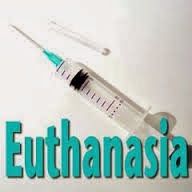Introduction
Euthanasia is the termination of a very sick person's life in order to relieve them of their suffering.The term is derived from the Greek word euthanatos which means easy death.Ethics Involved :
Euthanasia raises a number of agonising moral dilemmas:
- is it ever right to end the life of a terminally ill patient who is undergoing severe pain and suffering?
- under what circumstances can euthanasia be justifiable, if at all?
- is there a moral difference between killing someone and letting them die?
Why Euthanasia should be forbidden ?
Religious opponents of euthanasia believe that life is given by God, and only God should decide when to end it.
"First, do no harm" is the oldest oath in medicine. It solemnly confers the doctor's duty to prevent rather than cause distress. When it comes to treating children, doctors are especially mindful of this obligation.
Other opponents fear that if euthanasia was made legal, the laws regulating it would be abused, and people would be killed who didn't really want to die.
"First, do no harm" is the oldest oath in medicine. It solemnly confers the doctor's duty to prevent rather than cause distress. When it comes to treating children, doctors are especially mindful of this obligation.
Other opponents fear that if euthanasia was made legal, the laws regulating it would be abused, and people would be killed who didn't really want to die.
The legal position
Euthanasia is illegal in most countries, although doctors do sometimes carry out euthanasia even where it is illegal.Types :
Active euthanasia
Active euthanasia occurs when the medical professionals, or another person, deliberately do something that causes the patient to die.Passive euthanasia
Passive euthanasia occurs when the patient dies because the medical professionals either don't do something necessary to keep the patient alive, or when they stop doing something that is keeping the patient alive.- switch off life-support machines
- disconnect a feeding tube
- don't carry out a life-extending operation
- don't give life-extending drugs
Countries Legislation :
- Most countries make a clear distinction between “active euthanasia” which involves a deliberate action to end life and “passive euthanasia” which involves the withdrawal of medical treatment.
- Netherlands was the first country in the world to legalise euthanasia in 2002 followed by Belgium and Luxembourg.
- In Sweden a terminally ill patient can take the decision to halt life support whereas in Switzerland providing means to assist suicide is legal and does not require medical assistance.
- Swiss euthanasia organisations such as ‘Dignitas’ are controversial as they even provide assisted suicide to foreigners.
- In France active euthanasia is illegal but the matter has been thrown open to public debate by President Francois Hollande who wants to bring in a law that allows patients to “end their life in dignity”.
Feb 2014 :
- Belgium came a step closer to legalising euthanasia for children more than a decade after it legalised the “right to die” for adults. The bill legalising mercy-killing for minors suffering from “unbearable physical suffering” will was to be put to vote in the Belgian Parliament. If the vote does go through, Belgium will become the first country ever to allow euthanasia without any age limit

